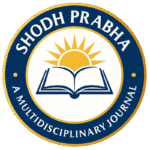1. Overview
Shodh Prabha: A Multidisciplinary Journal follows a double-blind peer review process to ensure that all manuscripts meet the highest standards of academic excellence, originality, and integrity. This process is designed to maintain impartiality, eliminate bias, and uphold transparency in editorial decisions. Both the author(s) and reviewers remain anonymous throughout the review cycle.
2. Submission Screening
- Every manuscript received by the editorial office is first screened by the Editor-in-Chief or an Editorial Board Member.
- Initial screening involves checking for scope relevance, plagiarism, formatting compliance, and ethical integrity (using plagiarism detection software, such as Turnitin or iThenticate).
- Manuscripts that do not align with the journal’s scope or show plagiarism beyond the permissible limit are rejected at the preliminary stage.
3. Assignment to Reviewers
- Manuscripts that pass the initial screening are assigned to two or more qualified independent reviewers who are experts in the relevant field.
- Reviewers are selected based on their academic credentials, subject expertise, and prior research contributions.
- The review process follows the double-blind model, meaning neither authors nor reviewers know each other’s identities.
4. Evaluation Criteria
Reviewers are requested to evaluate the manuscript on the following parameters:
- Originality and significance of the research problem
- Clarity of objectives and soundness of methodology
- Relevance and depth of literature review
- Coherence of argumentation and analysis
- Accuracy of data interpretation and results
- Contribution to the existing body of knowledge
- Language quality and overall presentation
Reviewers provide constructive feedback and recommendations under one of the following categories:
- Accept without revision
- Accept with minor revisions
- Major revisions required (resubmission for further review)
- Reject (unsuitable for publication)
5. Editorial Decision
- Based on reviewers’ comments, the Editor-in-Chief or Section Editor makes the final decision regarding acceptance, revision, or rejection.
- The editorial team may seek additional opinions if the initial reviews conflict.
- Authors are informed of the decision along with detailed reviewer feedback.
6. Revision and Resubmission
- Authors receiving revision requests are expected to submit the revised manuscript within the prescribed timeline (usually 7–15 days for minor revisions, 20–30 days for major revisions).
- Revised manuscripts must include a response document detailing how each reviewer’s comment has been addressed.
- The revised version may be re-evaluated by the original reviewers or by the editorial board before final acceptance.
7. Final Acceptance and Proofs
- Once accepted, the manuscript undergoes final proofreading, formatting, and plagiarism verification before publication.
- The corresponding author receives a pre-publication proof for final approval.
- After author approval, the article is published online in the upcoming issue, with DOI assignment (if applicable) and indexing submission.
8. Review Timeline
The average review duration is:
- Initial Screening: 3–5 working days
- Peer Review: 15–20 working days
- Revision & Final Decision: 5–10 working days
The total processing time generally ranges between 30 to 45 days, depending on reviewer availability and the complexity of revisions.
9. Confidentiality and Ethics
- All manuscripts and review reports are treated as strictly confidential documents.
- Reviewers are prohibited from sharing, reproducing, or citing any unpublished material.
- The journal adheres to the ethical guidelines of the Committee on Publication Ethics (COPE) and ensures transparency in all editorial decisions.
- Any detected conflict of interest must be declared by both reviewers and editors before the review process begins.
At Shodh Prabha, we believe that a fair, unbiased, and rigorous peer review process forms the foundation of scholarly publishing. Our editorial team is dedicated to ensuring that every published paper contributes meaningfully to the advancement of knowledge and maintains the highest ethical standards.
